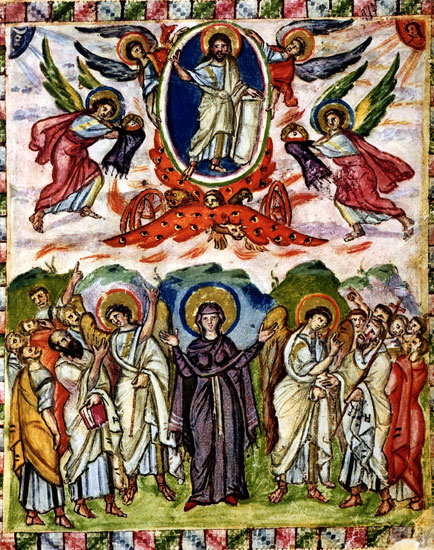
The event that we celebrate on this feast,
the Ascension of Jesus into heaven,
is recounted in our first reading, from the book of Acts.
Our Gospel reading, from Matthew,
doesn’t mention the Ascension
but rather tells us of the risen Jesus
commissioning his disciples
and promising to remain with them always.
Even though Matthew’s Gospel does not recount
the event of the Ascension,
there is a deep connection between this story
of the commissioning of the disciples
and Jesus' ascending to the right hand of the Father.
Matthew tells us that when the disciples saw Jesus,
“they worshipped, but they doubted.”
What is it that they doubt?
They don’t seem to doubt Christ,
since it says they worshipped him.
Perhaps they doubt their own capacity
to carry out the mission Jesus is giving them.
It is, after all, a daunting task he gives them:
“make disciple of all nation. . .
teaching them to observe
all that I have commanded you.”
Not, “make disciples of some nations”
or “make disciples of as many nations as you can,”
but “make disciples of all nations.”
Not, “teaching them to observe
some of the things I have commanded you”
or “teaching them to be just a little bit better,”
but “teaching them to observe
all that I have commanded you.”
This is a pretty tall order.
No wonder they doubted.
How is it possible for their small band
to make disciples of all nations?
How could they even remember,
much less teach others to observe,
all that Jesus had commanded them?
Perhaps it was these two “all”s
that caused them to doubt.
But the commission
to make disciples of all nations
and to teach them to observe
all that Jesus had commanded
is matched by two other “all”s in Jesus’ words:
“All power in heaven and on earth has been given to me”
and “I am with you always,” –
the Greek is literally “all the days” –
“until the end of the age.”
As if in answer to the disciples’ doubts
about their ability to go to all the nation
and to teach them all that Jesus had commanded,
Jesus reassures him that he has “all power”
and will be with them “all the days”
and that they should therefore
not doubt their ability to carry out
the mission that he is giving them.
And it is in this second pair of “all”s that we find
the true meaning of this feast of the Ascension.
As St. Paul says in our second reading,
the Father of glory has raised Christ,
“far above every principality,
authority,
power
and dominion”
and has “put all things under his feet”
so that now he “fills all things in every way.”
If we think of this feast simply as saying
that Jesus has gone to live with God
somewhere above the clouds,
then it might seem as if the Ascension
places Jesus at a greater distance from his disciples
and calls into question his claim
that he will be with them all the days,
until the end of time itself.
But if we think of the Ascension
as Jesus’ full sharing in divine power
then, rather than being a departure,
it is what Pope Benedict has called
“the beginning of a new nearness.”
Jesus in his humanity is now present
to all times and places
just as God is present always and everywhere.
The Ascension tells us that the one who was born of Mary,
taught and healed,
suffered and died,
is as near to us as he was to his disciples
two millennia ago;
indeed, he is in some sense nearer to us.
He is present to us
because he has received power to fill all things.
And if he is with us then we need not doubt
that he will bestow upon us what we need
to fulfill the mission that he gives us.
It is easy for us to fall into thinking that we Christians
are followers of someone who lived a long time ago
and who remains with us only in the form
of some interesting stories and intriguing ideas.
But the feast of the Ascension tells us that this is not true;
when we say that Jesus has ascended to the right hand of God,
we are not saying that he has left this world for some other,
but that he is present in this world
with a new nearness,
sharing with us the power of his risen life.
Where is the ascended Jesus?
Not calling out to us across the centuries,
but speaking to each of us directly
in the words of Scripture.
Where is the ascended Jesus?
Not somewhere above the clouds,
but placing himself in our hands
in the Eucharist we celebrate.
Where is the ascended Jesus?
Not managing some cosmic bureaucracy
but consoling and challenging us
through our fellow Christians
who are his body, the Church.
Like the disciples, we too worship . . .
and doubt.
We come here to worship,
because we believe in him,
but we also doubt that we can do all that he asks of us.
But the feast of the Ascension calls us
to cast those doubts aside
and believe that the one
who “fills all things in every way”
is present to us with a new nearness,
even until the end of time.